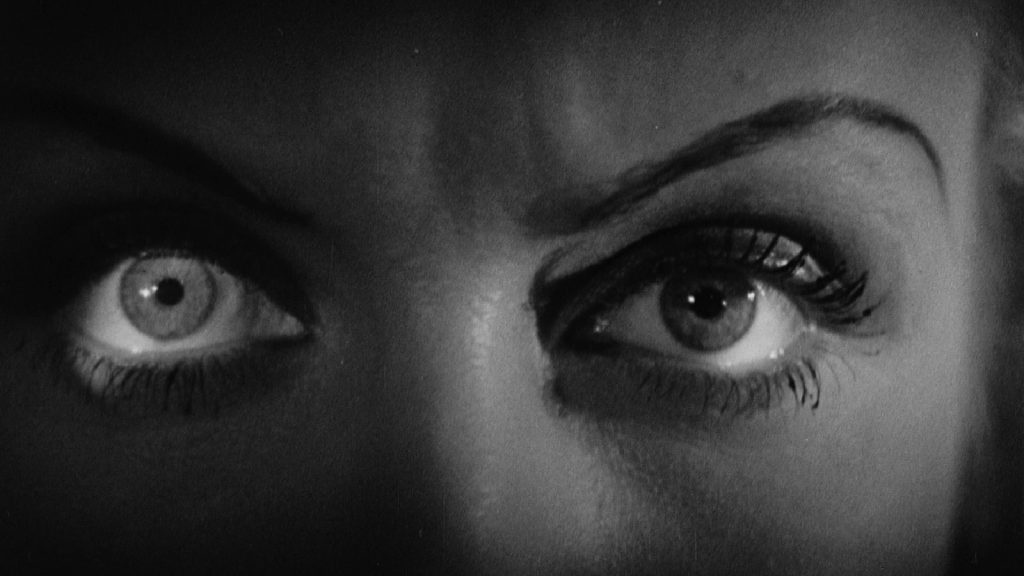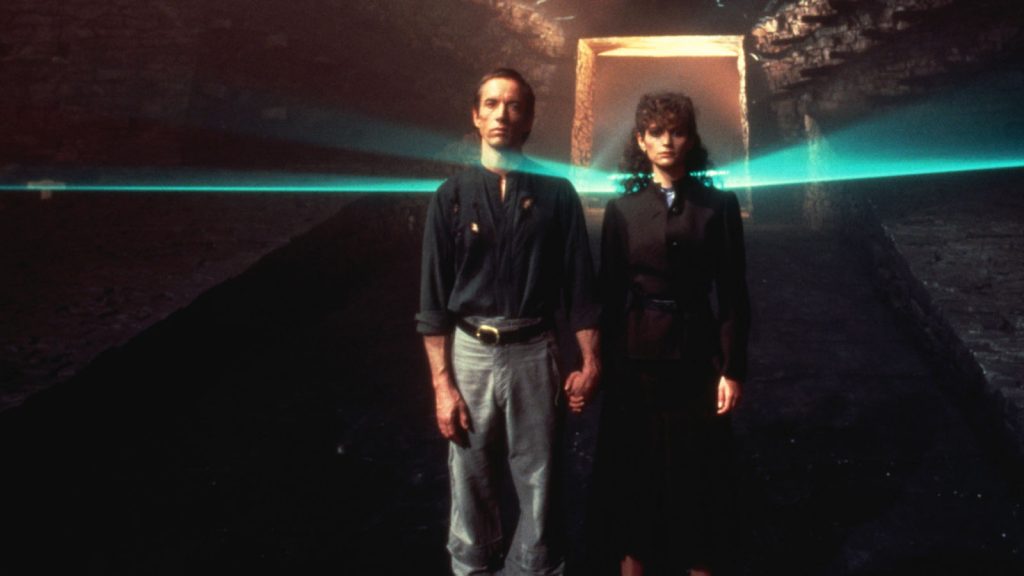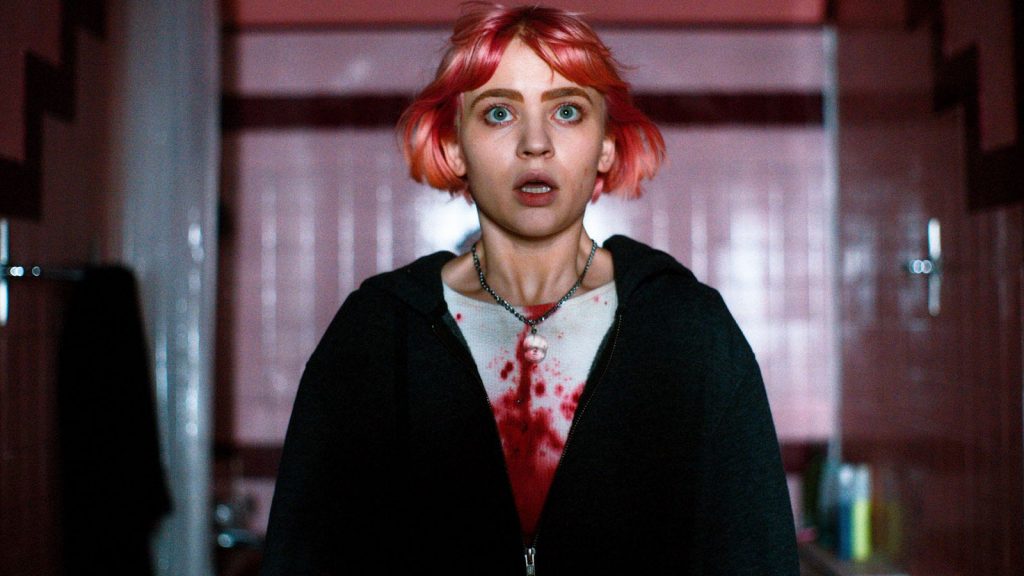
The title of David Cronenberg’s latest film resonates in myriad ways. “The Shrouds” is the name of an exclusive Toronto cemetery co-owned by inventor/entrepreneur Karsh (Vincent Cassel), whose company, GraveTech, offers clients the opportunity to behold their dearly departed’s cadaver as it decomposes in real time. This can be done on-site during visiting hours via a touchscreen mounted to the assigned headstone or online anytime via an app; both methods connect to a series of subterranean cameras surrounding the corpse, providing 360-degree views. Early in the film, we hear Karsh, a widower whose beloved dead wife, Becca, is a permanent resident of The Shrouds, give a layman’s explanation of the technology to Myrna (Jennifer Dale, in a brief but elegantly balanced performance), a woman with whom he’s on a first date—one that begins at the cemetery’s chic restaurant. Trying to gauge Myrna’s oscillating ratio of intrigue and unease, Karsh hesitates before offering a full tour. “How dark,” he asks, “are you willing to go?”
The question doubles neatly as a provocation for the prospective spectator. Blending morbid obsession, visceral grief, and shameless innuendo, Karsh’s allure, like that of The Shrouds, which pivots between mournful memory play and abstruse conspiracy thriller, will not be to everyone’s taste. Some will be dismissive, some will be disgusted, perhaps offended, while others will recognize a network of chilling insights into the psychology of sorrow and the ways our voyeuristic fetishization of technological novelty, from virtual assistants to autonomous vehicles, has opened the floodgates to a global surveillance state: every device introduced in The Shrouds reminds us how we opt in to our own peril. To note that aspects of the story are risible or prurient seems barely relevant, as so many of Cronenberg’s films, including several of his best, such as Videodrome (1983), Dead Ringers (1988), and Crash (1996), thrive on turning audacious, abstract ideas into urgent, corporeal melodramas. Their surface silliness doesn’t negate their psychic impact. What complicates responses further is the fact that Karsh is so clearly modeled after his creator, not only because of that distinctively swept-back silver mane, which from a distance renders Cassel a Cronenberg doppelgänger, but also because, as the Canadian auteur’s admirers likely know, Cronenberg himself lost his beloved wife, Carolyn Zeifman, in 2017. This meta-knowledge infuses The Shrouds with a heavy air of intimate disclosure: the film is, at heart, personal essay shrouded in speculative fiction. Though, this being a Cronenberg film, that disclosure is balanced by a wide-eyed fascination with the relationship between bodies and machines. The Shrouds is haunted by the question of who owns our bodies, in family and marriage, work and play, sickness and health, life and death.

The film’s labyrinthine plot gets underway with the discovery that The Shrouds has been vandalized in a manner that appears strategic, but whose motives are inscrutable. Leery of involving authorities, Karsh plays amateur detective, employing skittish computer nerd Maury (Guy Pearce) to handle the digital grunt work. As Karsh becomes enveloped in a burgeoning swirl of paranoid speculation, he’s visited, in what are either dreams or hallucinations, by Becca, whose naked body, replete with amputations prompted by her cancer, is both highly eroticized and rife with pathos. Karsh is also visited, in waking life, by Becca’s sister Terry, a veterinarian turned pet groomer who seems relatively levelheaded, until it’s revealed that she’s wildly aroused by conspiracy theories. Both Becca and her sister are played by Diane Kruger, who is easily The Shrouds’s MVP, charged with embodying the many variants of painful longing Cronenberg seeks to invoke. If, despite its goofier elements, The Shrouds moves you, as it does me, a lot of credit must be given to Kruger, whose subtle dynamics perfectly align with the film’s emotional core, while eschewing histrionics. The difficulty of apprehending Cronenberg’s delicate tone is, in fact, perfectly encapsulated in the contrast between Kruger and Cassel, a gifted actor, but ill-cast here, whose blunt line readings fall increasingly flat as the film gets weirder. I can’t help but imagine this director’s stand-in played by Cronenberg alumni Jeff Goldblum or Willem Dafoe, both of whom are closer to Cronenberg in age, both of whom possess the capacity for the playfulness, detachment, and irrepressible awe that seem key to conveying Karsh’s complex character, with all his grave humor, and the accumulation of bizarre detours he’s forced to navigate on route to an ending that doesn’t so much conclude as drift away, with Karsh aboard a private jet that vanishes into a veil of cloud.

is a freelance critic and playwright.
The opening image of David Cronenberg’s Crimes of the Future is arresting, enigmatic...
BY JOSÉ TEODORO | June 7, 2022
It’s an unfortunate fact of life: even super-smart women sometimes end up with terrible boyfriends. This, along with a very different tragic, universal reality—everyone’s body radically changes and deteriorates with illness...
BY VIOLET LUCCA | October 31, 2022
Before we assess the villain, let’s begin with the hero—and “hero” is the correct appellation...
BY JOSÉ TEODORO | November 3, 2024

This pre-Code offering packs a lot of story into its typically brisk running time, with several plot threads weaving together a (not always successful) tapestry of spooky and criminal doings.
READ MORE >
BY ANN OLSSON | Month 00, 2021

In what could be the fastest-resulting rape revenge movie, a drunken lout brutally forces himself on Ida, the young woman who doesn't return his affections, during a party over Labor Day.
READ MORE >
BY LAURA KERN | Month 00, 2021

Beast is a lot of movies in one package - fractured fairy tale, belated-coming-of-age story, psychological drama, regional horror film - but above all it's a calling card for its leading lady, Jessie Buckley.
READ MORE >
BY LAURA KERN | Month 00, 2021